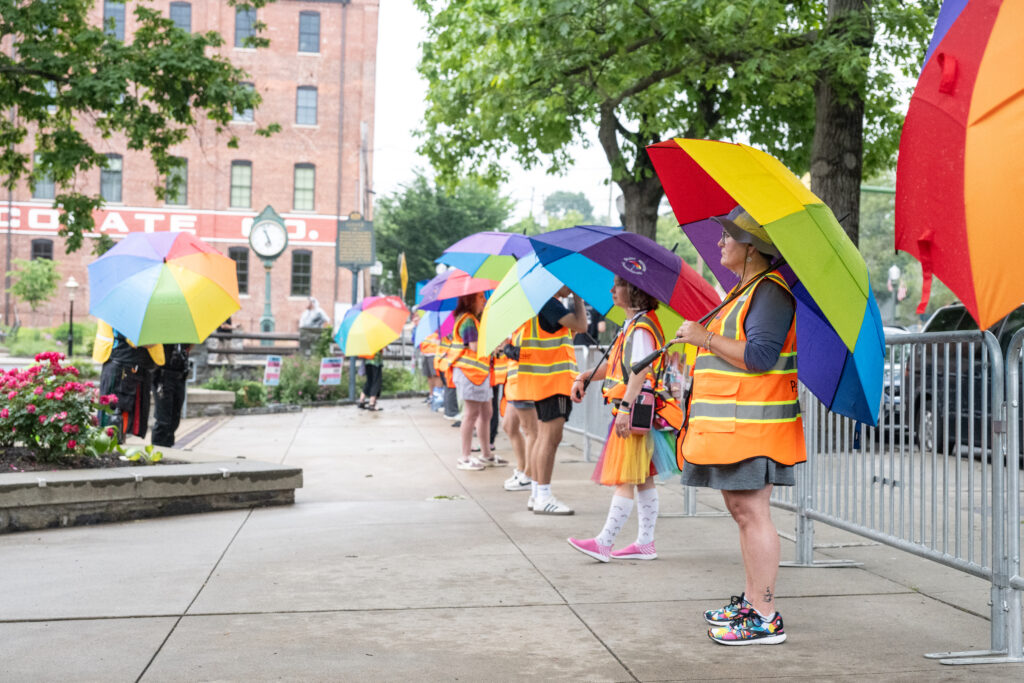By Dick Wanner
My first surprise when I turned the corner from East Lincoln Street to Broad Street, heading for Lititz Springs Park, was not that there was a crowd gathering for the June 7 Pride Fest. I was puzzled by the pedestrian barriers on the sidewalk at the entrance to the park. It was a free event. Why the barriers?
My second surprise came when I reached the Parkview Hotel, where a marked street crossing leads to the park entrance. I was accosted there by a man who wanted to give me a religious tract, which I politely declined.
“Why?” he demanded. “It tells the truth about what’s going on over there! About the evil that’s going on. Are you afraid of the truth?” He held the tract up to my face. I told him I didn’t want it.
“I know what it says.”
And then came my third surprise. A gentle lady with graying hair and a kind face stepped between me and my accoster. She was holding a rainbow umbrella, a significant accoutrement of the LGBTQ+ community. Mr. tract man peered at me from behind the umbrella. “Don’t listen to her! She’s a third-grader! She knows nothing!”
The gentle lady looked at me, and asked in a calm, quiet voice, “Would you like to cross the street?”
“She knows nothing!”
I gestured at the bully on the other side of her umbrella, thinking I wanted to say more. “Love is love,” I said, “Doesn’t matter who you love.”
“Sir, would you like to cross the street?”
So, okay. I was ready to cross the street. And just to enrage the bully, drive him a little crazy, I wanted to hold my rescuer’s hand as we crossed Broad Street, but I didn’t have the nerve to ask her if that was okay.

When we reached the park side of the street, the reason for the barriers was obvious. They were there to discourage the more than a dozen “street preachers” from entering the park. They were free to shout their hate-filled message from the sidewalk, but if they wanted to join the festival, they would have to go through a metal detector and wear a rainbow colored wristband.
Metal detectors were another surprise. Everybody who went into the park had to pass through one of two metal detectors — put your keys, coins, wallet into a basket, just like at the airport — then walk through the metal detector, get a rainbow wristband and feel free to roam, buy stuff, talk to people. Just like any other peaceful, family-friendly day in the park.
And it was peaceful, thanks in large measure, I believe, to about 100 volunteers from Lancaster County Chooses Love and the Silent Witness Peacekeepers Alliance. The SWPA was founded in 2000 to provide peaceful support for participants in a Harrisburg pride festival beset with street preachers — like my accoster — whose gospel was based on hatred for the LGBTQ+ community.
In every one of the first four Harrisburg Pride festivals, at least one person was arrested for some sort of physical confrontation, I learned from Alanna Berger, a Mechanicsburg resident who is now executive director of the SWPA. After the 2003 event, Harrisburg’s mayor threatened to shut down all pride events if one more person was arrested at a pride function. Berger was at Lititz Pride and was the first person I talked to after I had cleared the metal detector and gotten my rainbow wristband.
She told me how, in 2004, a group sympathetic to the LGBTQ+ movement scheduled a showing of a documentary film sympathetic to Tim Wheeler, a gay boy from Lebanon County who committed suicide after years of bullying by classmates. Berger learned of a protest being planned at the film’s venue by members of the Westboro Baptist church.
“I knew Tim’s mother was going to be at the showing, and I knew Westboro members would be outside yelling all kinds of things — like how her dead son was burning in hell because he was gay.
“Well, I’m a mom, too, and I thought, ‘Not on my watch!”
Berger and her husband became peacekeeper members, and they organized a group of 80 volunteers who circled the venue for the showing. Later in the year, they organized another group to maintain order at the 2004 Harrisburg Pride Festival. There were no arrests at either of those events, and pride festivals have been getting a green light in Harrisburg ever since.
Berger said the witnesses are trained to both prevent confrontations and to de-escalate them when they occur. One way to prevent confrontation was on full display that day in the park. A line of volunteer witnesses was lined up inside the barriers, their rainbow umbrellas unfurled, shielding the festival goers from a view of the street preachers on the other side of the barriers.
There were about 100 volunteer peacekeepers working the Lititz festival, and no reports of confrontations that got out of hand.
Lititz Pride 2025 was organized by Lancaster County Chooses Love, which began in 2021 as Lititz Chooses Love. Parker Webb, a transgender man, and a few other Lititz residents formed the group as a reaction to vandals who destroyed a pride flag in a Lititz neighborhood.
“We held our first pride festival that summer in the Warwick Middle School parking lot, with the school’s permission,” Webb said. “I was surprised when nearly 300 people showed up.”
That first pride event was a listening project, he said. “I heard about the isolation in the gay community, and it wasn’t just from the pandemic. So we organized Lititz Chooses Love. We had no money. No organization. Just folks who really needed to be in communication with one another.
“So I said we don’t need money to go hiking. We hiked first at Middle Creek. We went back for the snow goose migration. That’s where it started. And we wanted to be very inclusive, so everything we did had to be accessible.”
Was it supposed to be just for the LGBTQ+ community?
“No,” Webb said. “Queer people have friends and family members who aren’t queer. We are part of the whole community. When we have events, like pride festivals, we welcome everybody. We don’t check your queerness level when you come to an event.”
In January, the organization changed its name from Lititz Chooses Love to Lancaster County Chooses Love. The name change reflected the growing role and acceptance of the organization, which is now chartered as a 501(c)(3) nonprofit with three executive partners, three part-time staff, an annual budget of $300,000 and an eight-member board of directors.
Laura Sabatini is a former teacher who has a masters degree in educational leadership from Johns Hopkins University. She left teaching to go into nonprofit work, and joined Lititz Chooses Love in 2022 first as a volunteer, then a part-time staff member, and finally as a second executive partner in 2024. The third executive partner is Jessica Purdy. Their roles, broadly speaking are Webb, community engagement, Sabatini, strategic planning, and Purdy, operations. Three other staffers take care of communications, bookkeeping, and program coordination.
Sabatini left another nonprofit to join the Lititz group. “I started getting involved in 2022 when I saw that this organization was doing its work in a different way than a lot of other nonprofits,” she said. “There are a lot of nonprofits that use volunteers, and a lot that don’t use volunteers at all. We really focus on the community, on bringing the community together, for everybody.
“Then in 2024 I left my other job and came here as full-time staff.”
What’s special about the way Lancaster Chooses Love interacts with the community?
Sabatini said there are programs designed specifically for people in the LGBTQ+ community, but the biggest program for the local group is the food pantry, at 104-106 Main Street, Lititz. It is open Wednesdays from 5-8 p.m., and Saturdays from 9:30 a.m. until 12:30 p.m.
Are there any requirements to receive food assistance? “No!” says their fact sheet for people seeking that assistance. “We have no requirements to be on assistance or prove anything to us. You can live in any zip code. The only ‘requirement’ we have is our sign-in sheet!”
In May, the pantry served 2,200 people. About half were first-time customers, the rest were repeats. Many families visit multiple times. The six-member staff obviously can’t handle the traffic, so a lot of community volunteers sign up to help.
As we talked, Sabatini looked across Lititz Run and up the hill towards the VFW building. “One of our biggest sources of volunteers is the VFW,” she said. “Some of their members are retired, have more flexible schedules than working folks, and they come to the pantry to help out.”
After a couple of hours of roaming around, talking to people, taking pictures, it was getting time for me to head back to Akron. I’d have to walk past the man who accosted me on my way in, and I wasn’t looking forward to that.
But I figured I had just spent two hours with people, mostly straight people, and a few LGBTQ+ people who were the reason for the festival. As an objective reporter, didn’t I owe that man the opportunity to express his views?
After I crossed the street, I stopped and told him I would listen if he would let me use his name and his picture in my story. He said that was okay, which surprised me. I wrote his name in my notebook and he posed for a photo. He told me his story. The gist I gathered from his words was that Jesus could not love gay people for the same reason he could not love Hitler. They were evil in equal measure.
So why am I not telling you his name? The name of his church? Showing you his picture?
Because doing so would be my small act of hatred. And that would be me spreading hate toward that man. I don’t hate the man. I find it hard to actually hate any human being. I hate this man’s views. With a passion. But I don’t hate the man.
What encouraged me, thrilled me, actually, as I was walking back to my car was the thought that while more than a dozen street preachers stood outside the Lititz Springs Park broadcasting words of hate, inside the park that day 4,700 visitors had come to see love at work.
(Dick Wanner is a freelance writer who works out of Akron. He can be reached at dickwanner@gmail.com.)


